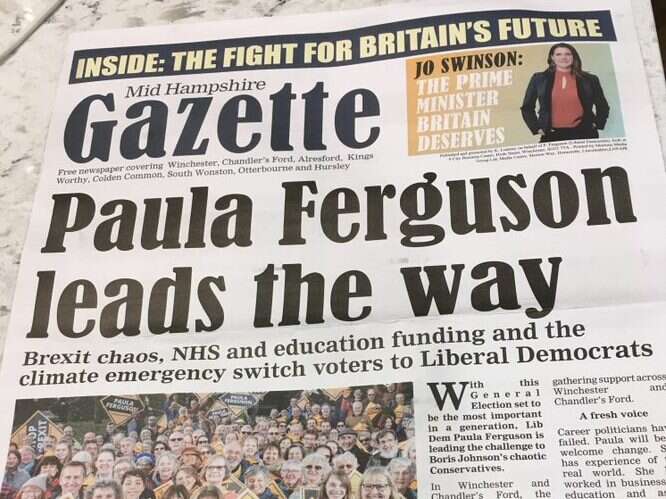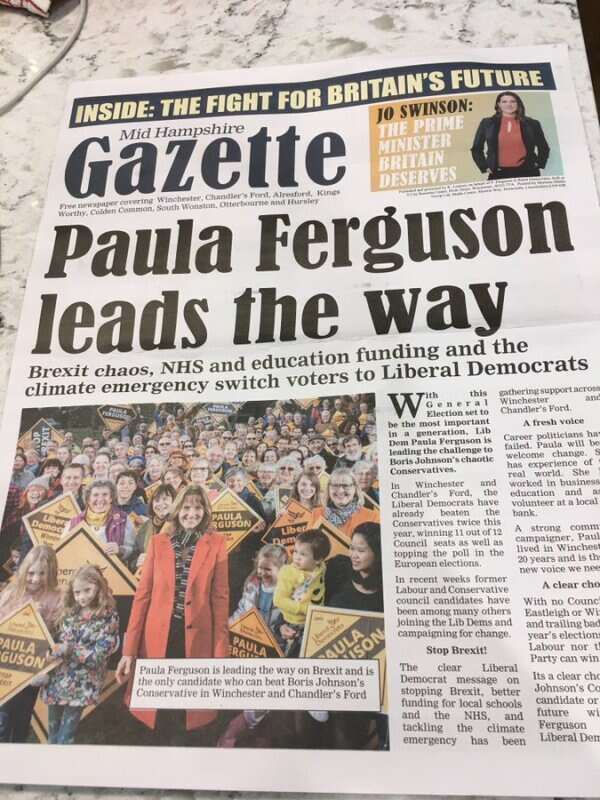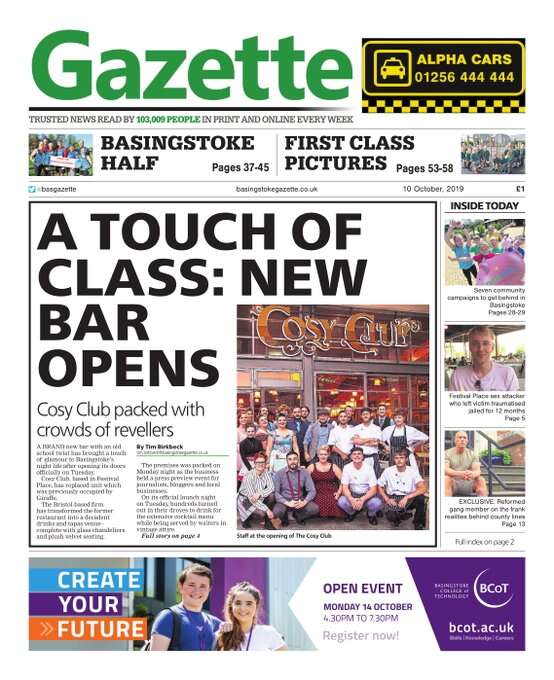
Newsquest’s editorial director has written to the Liberal Democrats calling on them to stop distributing election material styled like a local newspaper and apologise for the attempt to “mislead” voters.
Toby Granville earlier threatened to boycott Lib Dem campaign news across the publisher’s 150-plus regional titles in response to the “outrageous” pamphlet, which used a “Gazette” masthead.
The four-page “Mid-Hampshire Gazette”, supporting candidate Paula Ferguson, has been delivered to homes in an area covered by paid-for Newsquest weekly the Basingstoke Gazette (known locally as the Gazette).
The Lib Dem material says it is a “free newspaper” covering eight Hampshire towns, with an imprint in small font explaining who produced it, as required by the Political Parties, Elections and Referendums Act 2000.
Similar pamphlets have been published in a number of other constituencies, such as Chelmsford, Putney, Eastleigh, and Finchley and Golders Green.
In other areas, such as Leeds and south London, the imitation newspapers have a “News” masthead preceded by the region covered. In others like Oxford, it is an “Observer” masthead.

Gazette editor Katie French told Press Gazette she was “outraged” when she first saw the local Lib Dem pamphlet, calling it a “disgrace”.
Such election material has since been criticised by the likes of the News Media Association, Society of Editors, and other regional editors.
“Local newspaper journalists across the country work very hard to provide readers with fair, balanced, impartial news in a neutral tone,” French said.
“People turn to local newspapers because they can trust us and something like this erodes that trust.
“If it was called the Lib Dem Gazette it would be a different story but the fact they’ve used a fake geographical name is very disappointing and very disingenuous and I think both readers and voters deserve better.”
In a letter to the Lib Dems’ legal team, Granville wrote: “The publication flagrantly mimics, for partisan political purposes, the name, style, layout and content of an independent local newspaper.
“It is our belief that it is designed to mislead in an attempt to pass it off in the minds of readers as having an association with our own title or another independent newspaper.
“No effort was made to consult with us before publication.”
He added that all Newsquest titles remain neutral at election time and that the Lib Dem pamphlet therefore “casts damaging and false imputations on Newsquest Media Group’s editorial independence and seriously undermines the relationship of trust and confidence between readers and local newspapers generally”.
He had earlier threatened to advise editors against covering Lib Dem campaign news, tweeting: “This is outrageous Lib Dems passing yourselves off as the Gazette newspaper in same area as our Basingstoke Gazette.
“If this isn’t pulled I’ll advise all Newsquest editors not to publish any campaign news for your party in build-up to #GE2019.”
French told Press Gazette she backed Granville’s warning, saying it would be “totally fair and just” to stop covering Lib Dem news.
“I think unless parties start behaving themselves there are going to be repercussions,” she said.
She added that such tactics show the Lib Dems are “not prepared to take into account” the work journalists do to be trusted, including ensuring all parties get an “even hearing”.
French said she did not support the imitation papers even in areas where there is not an existing title with the same masthead, saying: “I just don’t think it’s right.
“I think if their message is strong enough they should be able to put it in a leaflet like other parties do and to use a local newspaper format is really wrong because they are trading [on our trust].”

A recent Basingstoke Gazette front page
The Basingstoke Gazette had a circulation of 6,232 according to the latest available ABC figures from January to December 2018. It claims to reach 103,009 people in print and online each week.
The newspaper held a hustings event for its local candidates last night, and French said that although the issue came up, the Lib Dem candidate “made a bit of a joke of it and didn’t really address it”.
Other editors also criticised the papers, including the Yorkshire Post’s James Mitchinson who tweeted an image of the Lib Dems-produced North West Leeds and Wharfedale News.
He said: “Dear people of North West Leeds and Wharfedale: this isn’t ‘news’ as the masthead suggests.
“It’s political propaganda imitating local newspapers in order to borrow the trusting relationships that titles like ours in this region have worked so hard to build up with you. #fake news”
Dear people of North West Leeds and Wharfedale: this isn’t ‘news’ as the masthead suggests. It’s political propaganda imitating local newspapers in order to borrow the trusting relationships that titles like ours in this region have worked so hard to build up with you. #FakeNews pic.twitter.com/OOaAnk4puv
— James Mitchinson (@JayMitchinson) November 26, 2019
The News Media Association agreed that trust was at risk, saying: “By scrutinising candidates on behalf of the public in communities across the UK, local news brands play a vital role in upholding democracy.
“Dressing up party political material as independent journalism undermines this and damages trust in both news media and politicians.”
The Society of Editors called for requirements banning parties from aping existing newspapers and requiring information explaining who is paying to be printed more prominently in “large, bold typeface” on these front pages.
The Society’s executive director Ian Murray said: “It is ironic how it is often politicians who complain about fake news but then set out to at least blur the lines for readers – and in this case voters – by packaging their partial messages to ape independent newspapers.
“If political parties were genuine in their desire, often expressed, to both remove the effects of fake news and disinformation as well as support existing regional and local media they would take steps to ensure their political freesheets look markedly different to real newspapers.”
Responding to Press Gazette, a Lib Dem spokesperson said: “This is the Basingstoke editor complaining about something that was not distributed anywhere near his circulation area.
“As far as we know he has not contacted us directly and we will be happy to talk with him about this if he does.
“In the meantime, we remain committed to communicating with people, and tabloid newspapers has been one way of doing this employed by all political parties for decades.”
Newsquest also raised the issue with the Electoral Commission.
The Electoral Commission told Press Gazette that while it does not regulate election material content or design, it has “consistently called for campaigners to take their vital role responsibility and support transparency in campaigning”.
The Conservatives have also been criticised for creating “local newspapers”, with one Sidmouth Herald reader describing the Tories’ East Devon Future as “misleading” with imprints “not intended [to be found] without careful scrutiny”.
A Conservative Party spokesperson said in response: “This type of literature is commonly used by parties up and down the country and meets all the relevant laws and guidelines.”
The Conservatives were last week slammed for rebranding their press office Twitter account as “Fact Check UK” for the duration of ITV’s debate between Boris Johnson and Jeremy Corbyn.
A Labour-run Twitter account called The Insider described as a “UK Labour account giving you facts, information and comment you can trust” subsequently came to light.
Picture: Reuters/Hannah McKay
Email pged@pressgazette.co.uk to point out mistakes, provide story tips or send in a letter for publication on our "Letters Page" blog
